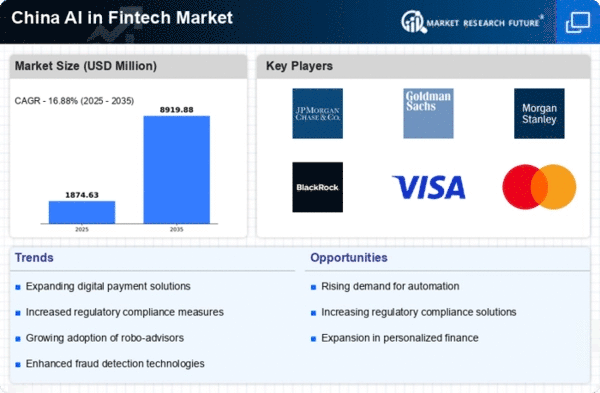Rising Cybersecurity Concerns
As the digital transformation of financial services accelerates, cybersecurity concerns are becoming a critical driver for the ai in-fintech market in China. Financial institutions are increasingly targeted by cyber threats, prompting a heightened focus on AI-driven security solutions. The market for AI in cybersecurity is expected to grow by 25% annually, as firms seek to protect sensitive data and maintain customer trust. By employing AI technologies for threat detection and response, financial organizations can enhance their security posture, thereby fostering confidence in their services. This growing emphasis on cybersecurity is likely to propel further investment in AI solutions within the fintech sector.
Technological Advancements in AI
The rapid evolution of artificial intelligence technologies is a primary driver for the ai in-fintech market in China. Innovations in machine learning, natural language processing, and data analytics are enabling financial institutions to enhance their service offerings. For instance, the integration of AI algorithms in credit scoring and fraud detection has shown to improve accuracy by up to 30%. As a result, financial companies are increasingly investing in AI solutions, with expenditures projected to reach $10 billion by 2026. This technological momentum not only streamlines operations but also fosters a competitive edge in a crowded marketplace.
Regulatory Support for Innovation
The regulatory landscape in China is evolving to support innovation within the ai in-fintech market. Authorities are implementing frameworks that encourage the adoption of AI technologies while ensuring consumer protection. Recent initiatives have focused on creating a conducive environment for fintech innovation, which is likely to stimulate market growth. For example, the People's Bank of China has introduced guidelines that facilitate the use of AI in risk assessment and compliance. This regulatory support not only mitigates barriers to entry for new players but also enhances the credibility of AI solutions in the financial sector.
Growing Demand for Personalization
Consumer expectations for personalized financial services are driving the ai in-fintech market in China. As clients seek tailored solutions, financial institutions are leveraging AI to analyze vast amounts of data and deliver customized products. Reports indicate that 70% of consumers prefer personalized experiences, prompting banks to adopt AI-driven tools for customer segmentation and targeted marketing. This shift towards personalization is expected to enhance customer loyalty and retention, with the potential to increase revenue by 15% for firms that effectively implement these strategies. Consequently, the ai in-fintech market is witnessing a surge in demand for innovative, personalized financial solutions.
Increased Investment in Fintech Startups
The influx of venture capital into fintech startups is significantly impacting the ai in-fintech market in China. Investors are increasingly recognizing the potential of AI-driven solutions to disrupt traditional financial services. In 2025, investments in fintech are projected to exceed $30 billion, with a substantial portion directed towards AI technologies. This trend is fostering a vibrant ecosystem where startups can innovate and scale rapidly. As these companies develop cutting-edge AI applications, they contribute to the overall growth of the market, enhancing competition and driving advancements in service delivery.
















